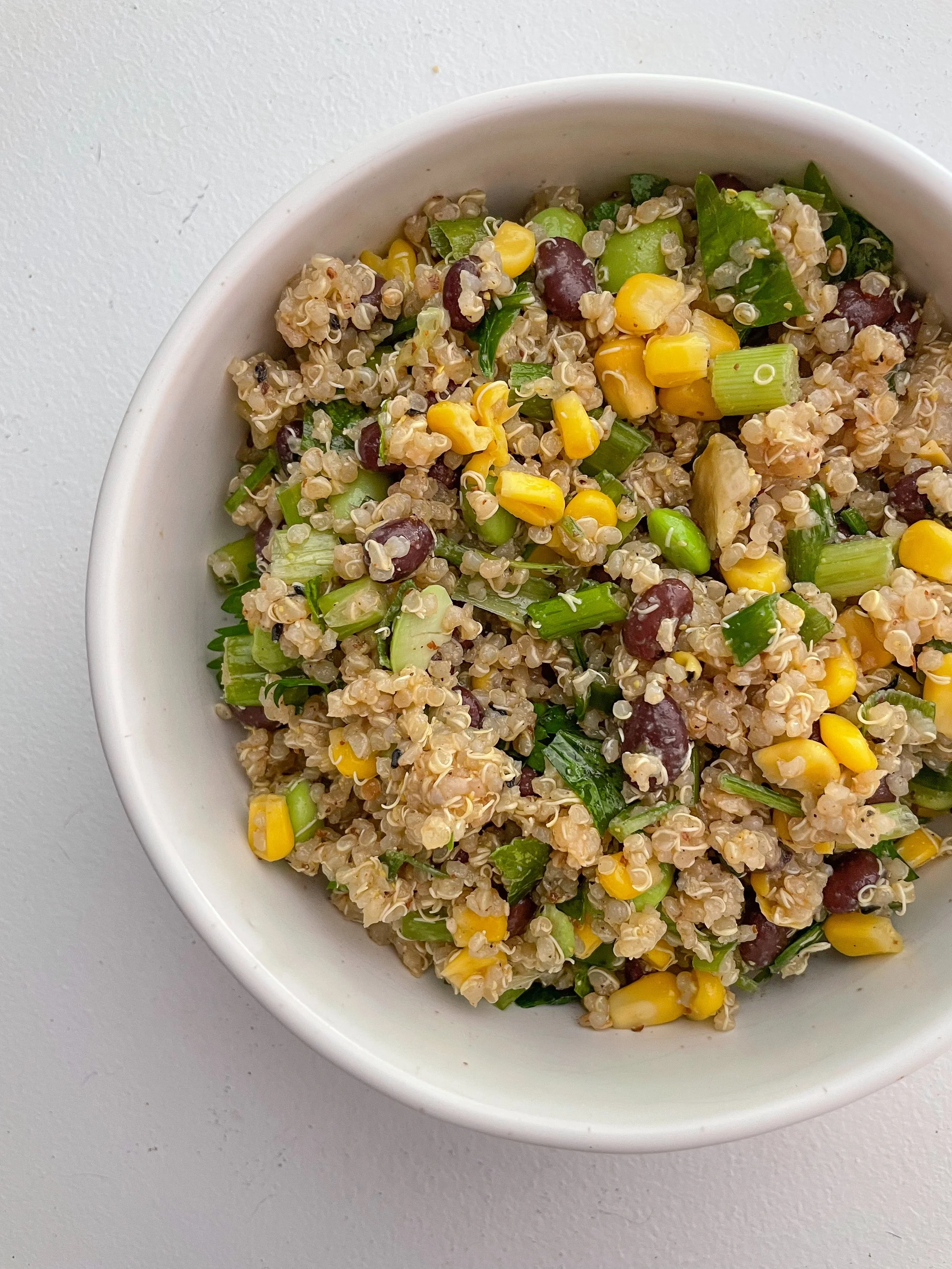Tips for Hyperthyroidism and Graves Autoimmune Disease
Hi, I’m Jordan. I’m a gut health and hormone nutritionist that advocates we eat lots of plants. I decided I should test my thyroid since I had a child 2 years ago and I forgot to do it at the one year mark. It surprisingly came back out of range: TSH very low, T4 was normal, T3 was high and antibodies were present. It was an odd picture and I was hoping it was thyroiditis (inflammation of thyroid) because I had a very sore throat. One month later, I did a re-test. TSH was even lower, T4 was now elevated, T3 higher and antibodies higher. I knew it was going to be graves due to my high resting heart rate of 150 and weight loss. I’m sharing my story and thyroid knowledge to help you!
I will do a separate post on hypothyroidism so stay tuned!
First, let’s talk about the basics of the thyroid.
It’s a small butterfly shaped endocrine gland located at the front of your neck. 1/100 people in Canada have hyperthyroidism and 2/100 have hypothyroidism. Many go undiagnosed unfortunately.
The thyroid gland secrets 3 hormones.
1- thyroxine (T4)
2- triiodothyronine (T3)
3- calcitonin (secreted by the C cells).
What about the thyroid stimulating hormone (TSH)? That actually isn’t a thyroid hormone at all, it’s made in the pituitary in the brain. It signals the body to make more or less of the thyroid hormones. An example of the brain body feedback loop.
What you need to know.
T4 contains 4 iodine atoms and 2 tyrosine molecules, while T3 contains 3 iodine atoms. When stimulated by TSH, T3 and T4 come out of the thyroid molecule into the plasma. 99% of these hormones are bound to thyroxine-binding globulin, barely any is ‘free.’ It’s important to know that T3 is more active than T4 and the body needs selenium in order to do the conversion of T4 to T3.
Role of T3/T4
protein synthesis and energy release from cells
growth and sexual development
metabolism
development of the nervous system
help maintain blood pressure ‘
impact cardiovascular system (heart rate)
releases energy as heat keeping the body warm
Hyperthyroidism is a state of elevated levels or thyroid hormones in the body.
Symptoms:
shaky hands
unable to tolerate heat
loose bowel movements
fast heart rate
weight loss
trouble sleeping
tired
muscle weakness
anxious, irritable, nervous
sweating
heart failure if left unsupported
bone health changes
Causes:
Graves disease is an autoimmune condition more common in people assigned female at birth. The immune system makes antibodies that cause the thyroid hormones to be made in excess contributing to weight loss and a fast heart rate. Some people have loose bowels too, think everything is sped up. A smaller percentage of people will also have buldging eyes. There is a 7x higher chance of developing Graves postpartum (6-12 month window). If you have another autoimmune condition, there is a higher chance of developing Graves. It most commonly diagnosed between the ages to 30-60. Stress can trigger graves - I definitely think that’s a factor for me. There is a huge connection with gut health as well. H. pylori is linked to thyroid disease and if you’ve never tested for this bad bacteria, how would you know you have it. I love using the GI-MAP stool test to support gut and hormone health. There is also a genetic component so I recommend testing if your sibling or parents have an autoimmune thyroid disease.
Toxic thyroid adenoma is a tumour that secrets T4 and T4
Toxic nodular goitre occurs when someone over 50 has had a non toxic goitre for years
Thyroid secreting tumours in the ovary or pituitary (brain)
There is some research linking thyroid autoimmune disease with COVID-19 or the vaccination. I don’t think this applies to me as my symptoms only showed up recently
Subacute thyroiditis is what I was hoping I had. It’s thought to develop after a viral infection
If you have hyperthyroidism, please be familiar with the term a thyroid storm. This is a medical emergency and you need to go to the hospital. It involves an acute onset on many hyperthyroid symptoms.
Recommendations
I always suggest working with a practitioner to discuss these tips as everyone is unique, but here are some general diet, supplement and lifestyle suggestions
Diet & nutrition for thyroid health
Avoid or limit caffeine as your heart rate is already elevated. I still have matcha and decaf coffee though : ) Note that coffee can reduce minerals, the benefits and drawbacks vary person to person
Avoid or reduce refined sugar and artificial sweeteners as much as possible. This is hard when you’re feeling tired, I get it
Focus on fibre for gut health, vitamins and antioxidants
Eating goitrogens are good because they block the absorption of iodine. The benefit comes from when they are raw: brocooli, brussels sprouts, cabbage and cauliflower, soy foods
Avoid any food you’re sensitive to
Avoid gluten! On my GI-MAP stool test I can see I’m having an immune response to gluten. The protein of gluten resembles the thyroid cells - check out molecular mimicry - this may be why there’s a link between H. pylori and thyroid disease too. The immune system attacks the wrong thing
Ensure you’re getting protein with each meal, 25-30 grams
For energy and vitality, consume dark leafy greens and other chlorophyll rich foods
Mineral rich foods high in magnesium, calcium and potassium (I love coconut water)
Supplements
Vitamin D, I encourage you to pay for testing, especially if living in Canada (I just did mine and I’m surprised it’s in range however I take 4000 iu)
Probiotics and/or S. boulardii
Minerals: magnesium, potassium in electrolyte form if not hitting daily goal (try chronometer app). I’m digging freshly pressed OJ with salt, coconut water, mineral sparkling water and magnesium powder lately
Algae oil may help with inflammation if antibodies present
Cucurmin or using turmeric often for inflammation/antibodies
Vitamin C, especially if Graves to support immunity
I’m taking zinc and warrior by this brand
Liposomal glutathione in times of need, THE antioxidant
Lifestyle
Aim for lots of sleep. I could write an entire blog post on tips for sleep!
Stress reduction: walking in nature, birds, music, meditation, movement, acupuncture, massage
The vagus nerve needs to be supported - gargling with water before you brush your teeth is a great way to habit stack
Support the liver (especially if on medication) with bitter foods, plant-based foods, whole foods
Support the HPA axis as cortisol may be high
Yoga
Ensure your gut is clear of infections and dysbiosis
Keep exposure to chemicals and endocrine disruptors low
Hydrotherapy has been used for eons to heal. When warm, wrap a cold towel around your neck then wrap a wool scarf or sweater around it for 30-45 minutes. This leads to vasoconstriction making the body pump blood and the lymphatic system.
Botanicals
Bugleweed lowers thyroid hormones. Don’t take if you have hypothyroidism or you’re on medication to lower T4/T3
Lemon balm tea or tincture
Chamomile, holy basil, passionflower, skullcap and valerian are all calming or sedative for the nervous system
Avoid: bladderwack, ashwagandha may cause excess thyroid hormones
Diagnosing Hyperthyroidism
thyroid blood test (TSH, T3, T4, antibodies: anti-thyroid peroxidase (TPOAb), anti-thyroglobulin antibody (TgAb), TSH receptor antibodies (TrAb). TrAb is Graves specific and will be positive if you have it
ultrasound to check for increased blood flow to the organ
thyroid uptake and scan using iodine - avoid if nursing
Other Testing (that I offer)
a GI-MAP stool test: your gut health impacts your thyroid health
A hormone test: example - cortisol, DHEA and thyroid hormones are high making estrogen, testosterone and progesterone low. The gut must be supported then thyroid - all the hormone making is going to a few specific areas versus being evenly distrubuted
Hair tissue mineral analysis to see if heavy metals are present and check mineral status
Prescription Treatment Options
Beta blockers will likely be needed to reduce your heart rate. You can often reduce these as the medication for hyperthyroidism kicks in
Methimazole is often recommend by doctors. It’s take once a day and you can have it near food and beverages, unlike hypothyroids medications
Propylthiouracil is taken 3 times a day and less gets through breastmilk
The latter two are quite hard on the liver so ensure you’re including bitter foods and your doctor is testing liver enzymes every couple weeks
Radioiodine therapy is an option for people not pregnant or nursing. It will essentially destroy the thyroid gland cells and you’ll become hypothyroid. You will need medication still or herbs to aid in the production of T4/T3, but it’s less dangerous than being in a state of hyperthyroidism
Surgery to remove the gland resulting in a similar situation to iodine exposure
Getting a graves diagnosis means I’ll be supporting my hormone and gut for the rest of my life. My Internal Medicine doctor confirmed 30-40% go into remission, but not much is known about the why. I hope I’m one of those people as I worry about the side effects taking the anti-thyroid medications long term. I would have never known I had thyroid, hormone and gut imbalances unless I paid for testing. Feeling grateful I offer this to clients and I have the means to pay for testing to get answers quickly.
See my detailed blog post on hypothyroidism and Hashimotos disease here.
If you’d like support in your hormone and gut health journey, apply to work 1:1 with me in services A hair tissue mineral analysis (HTMA) and a GI-MAP stool test is very beneficial for those with graves or hyperthyroidism
Make sure you check out our Instagram and Facebook page.






























